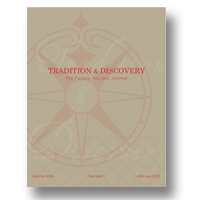|
|
|
1.
|
Tradition and Discovery: The Polanyi Society Periodical:
Volume >
23 >
Issue: 3
Phil Mullins
Preface
view |
rights & permissions
| cited by
|
|
|
|
|
|
|
2.
|
Tradition and Discovery: The Polanyi Society Periodical:
Volume >
23 >
Issue: 3
News and Notes
view |
rights & permissions
| cited by
|
|
|
|
|
|
|
3.
|
Tradition and Discovery: The Polanyi Society Periodical:
Volume >
23 >
Issue: 3
Elaine D. Hocks
Dialectic and the “Two Forces of One Power”:
Reading Coleridge, Polanyi, and Bakhtin In A New Key
abstract |
view |
rights & permissions
| cited by
The focus of this essay is to read the nineteenth-century theories of poet and philosopher Samuel Taylor Coleridge against the twentieth century theories of chemist and philosopher of science Michael Polanyi, and Russian philologist and critic Mikhail Bakhtin, showing their intellectual similarities and contrasts. My purpose in this essay is to redeem Coleridge’s thought for rhetorical theory by linking him to modern thinkers who are respected within the field.
|
|
|
|
|
|
|
4.
|
Tradition and Discovery: The Polanyi Society Periodical:
Volume >
23 >
Issue: 3
Dale Cannon
Sanders' Analytic Rebuttal To Polanyi's Critics, With Some Musings On Polanyi's Idea of Truth
abstract |
view |
rights & permissions
| cited by
This article reviews Michael Polanyi’s Post-Critical Epistemology by Andy F. Sanders but goes on to articulate certain crucial aspects of Polanyi’s post-critical understanding of truth that seem to be overlooked in Sanders’ account and which challenge conventional analyses of truth.
|
|
|
|
|
|
|
5.
|
Tradition and Discovery: The Polanyi Society Periodical:
Volume >
23 >
Issue: 3
Submissions for Publication
view |
rights & permissions
| cited by
|
|
|
|
|
|
|
6.
|
Tradition and Discovery: The Polanyi Society Periodical:
Volume >
23 >
Issue: 3
Andy F. Sanders
Criticism, Contact with Reality and Truth
abstract |
view |
rights & permissions
| cited by
Partly in reply to D. Cannon’s critique of my analytical reconstruction of Polanyi’s post-critical theory of knowledge, I argue that there are good reasons for not appropriating Polanyi’s programme of self-identication and the confessional rhetoric which may be derived from it. Arguing that “post-critical”should not be identified with an uncritical dogmatism, I then go on to suggest that the theory of tacit knowing had best be elaborated further by drawingon the work of J. Searle and M. Johnson. Finally, I make use of E. Meek’s account of the notion of “contact with reality”to highlight the Polanyian criteria of truth.
|
|
|
|
|
|
|
7.
|
Tradition and Discovery: The Polanyi Society Periodical:
Volume >
23 >
Issue: 3
Membership Information
view |
rights & permissions
| cited by
|
|
|
|
|
|
|
8.
|
Tradition and Discovery: The Polanyi Society Periodical:
Volume >
23 >
Issue: 3
C. P. Goodman
Polanyi on Liberal Neutrality
abstract |
view |
rights & permissions
| cited by
This paper suggests that moral neutrality erodes the liberal practices which sustain a free society. It supports the Polanyian claim that a free society is the political arrangement which is best able to realise universal ideals.
|
|
|
|
|
|
|
9.
|
Tradition and Discovery: The Polanyi Society Periodical:
Volume >
23 >
Issue: 3
James Stodder
Karl Polanyi On Ethics And Economics
view |
rights & permissions
| cited by
|
|
|
|
|
|
|
10.
|
Tradition and Discovery: The Polanyi Society Periodical:
Volume >
23 >
Issue: 3
Notes on Contributors
view |
rights & permissions
| cited by
|
|
|
|
|
|
|
11.
|
Tradition and Discovery: The Polanyi Society Periodical:
Volume >
23 >
Issue: 3
Electronic Discussion Group
view |
rights & permissions
| cited by
|
|
|
|





